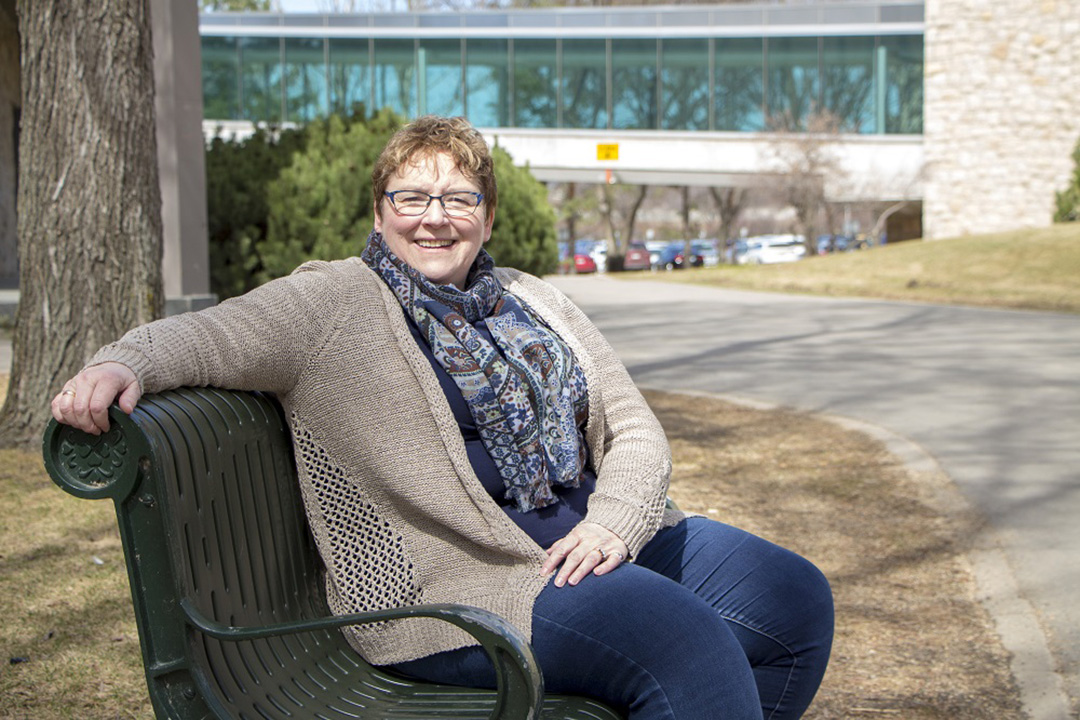
Sessional lecturer aims to support students with mental illnesses
Glorie Tebbutt knows what it is like to be a post-secondary student living with mental illness, so she created the Resilience Awards, a scholarship and bursary to help USask students who cope with mental health issues.
By SHANNON BOKLASCHUK / JESSICA ELFARTebbutt, a University of Saskatchewan (USask) sessional lecturer, remembers when bipolar disorder left her “unable to function” for nearly two years during her PhD studies. She was too ill to complete her doctorate.
Today, however, Tebbutt is healthy and is a thriving instructor in the Department of English in the College of Arts and Science, who speaks openly with her students about mental illness and the stereotypes associated with it.
“Becoming well has been both a long journey and is a daily choice,” said Tebbutt.
“The cliché ‘it takes a village’ applies to those living with a mental illness. I have had that village: excellent psychiatric care, a loving family, wonderful, supportive friends, lovely housing and meaningful employment.
“In 16 years of sessional teaching, I have never missed a class due to symptoms of my mood disorder. People can live with a serious mental illness and become well and excel.”
Now she hopes to give students the same hope and support she’s received, through the establishment of two new student awards.
As the recipient of the 2018 Sylvia Wallace Sessional Lecturer Award, Tebbutt received a $1,000 prize from the Gwenna Moss Centre for Teaching and Learning at USask. She has decided to use the money, along with a personal donation of $1,000, to establish a bursary and a scholarship for undergraduate students with mental illnesses. She also aims to contribute to the funds yearly, and encourages others to do the same.
“I wanted the award money to be generative, and what could be more generative than supporting the undergraduate education of students?” she said.
As Tebbutt researched various undergraduate student awards, she found ones that recognized students’ academic achievements, leadership, and physical illnesses or physical disabilities. However, there was no award acknowledging students coping with mental health challenges, she said.
Tebbutt wanted to change that, noting many students on campus are living with these diagnoses.
She named the awards the Resilience Bursary and the Resilience Scholarship. “I chose the name because people studying at the University of Saskatchewan have to be resilient. It’s about students and their courage, their dedication and their resilience, as they cope with a situation in addition to their studies.
“I want us, as a campus community, to begin to think differently about mental illness and functionality and acknowledge the strength and determination that some of our undergraduate students are living examples of.”
Tebbutt also noted that the current research and pharmacological advances in relation to the treatment of mental illnesses allow a number of students to pursue their academic goals.
“In fact, statistics from Access and Equity Services suggest that in the last few years, in particular, there has been an exponential shift in the number of students seeking some type of accommodation who self-identify as coping with at least one mental health diagnosis.
“Four years ago, AES reports that 28 per cent of students seeking accommodation identified as having a mental health diagnosis; in 2017, that number was 34 per cent and last year it was 47 per cent. These statistics do not account for the many students across campus who do not seek accommodation but are coping with a mental illness,” she stated.
Tebbutt received scholarships during her graduate studies and knows what a difference the financial boost can make to a student.
She worked with University Relations to develop the terms of the new awards and is now actively fundraising to boost the support available for students to access through the funds, now that the funds are in place. Students will be able to apply for the Resilience Bursary and Resilience Scholarship in the 2019-20 school year.
“I hope the awards will be a catalyst in the conversation about mental illness and functionality, on campus and beyond, about what is possible for students coping with and—in some cases—thriving despite their living with a diagnosis of a mental illness,” said Tebbutt.
“While there is a positive shift in how we are talking about mental illness, the stigma remains so powerful. I want the awards to acknowledge, support and celebrate students who are coping with a mental illness as they pursue their post-secondary education.”
Tebbutt said she is honest about her bipolar disorder diagnosis with her students, noting “I have a mood disorder and that is one part of my story, but it does not define me.” She said she enjoys learning with and from her students, and she is very grateful to be acknowledged for her work with them.
In fact, this past December she received a note from a student on his end-of-term exam that said how grateful he was for Tebbutt’s honesty and setting up the awards for students. “This student said he had been diagnosed with bipolar disorder and was encouraged by how healthy I was,” she noted.
It’s students like this that Tebbutt is hopeful the awards will help, by either rewarding academic achievements or helping those in financial need.
“People who are diagnosed with mental illnesses can’t necessarily do the punishing work of a part-time job because self care is an issue. Often they may take fewer classes through the year as a result, and then have to do summer classes. So that affects their ability to work to support their studies.”
Although Tebbutt said she has received a lot of recognition for starting this initiative, she remains humble. “I had so much love and care and support—if I can take part in that for other students, then that is the right thing to do.”
If you would like to make a donation to the Resilience awards to support students diagnosed with mental illness, please give at donate.usask.ca or call Bev Cooper at 1-306-966-2416.

